仁爱科普版八年级上册 Unit 2 Keeping Healthy 综合复习 课件 (共20张PPT)
文档属性
| 名称 | 仁爱科普版八年级上册 Unit 2 Keeping Healthy 综合复习 课件 (共20张PPT) | 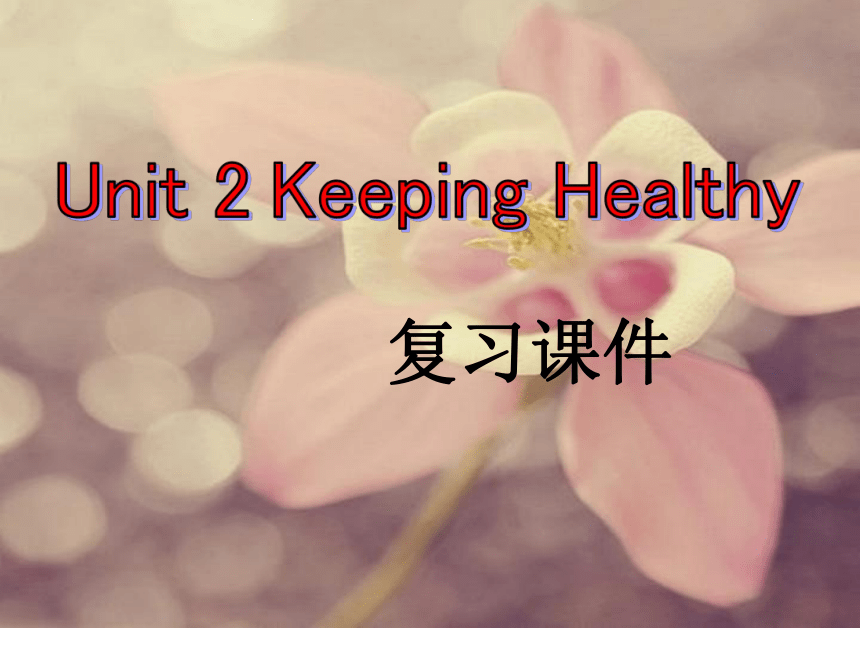 | |
| 格式 | zip | ||
| 文件大小 | 685.5KB | ||
| 资源类型 | 教案 | ||
| 版本资源 | 仁爱科普版 | ||
| 科目 | 英语 | ||
| 更新时间 | 2022-08-24 09:20:56 | ||
图片预览

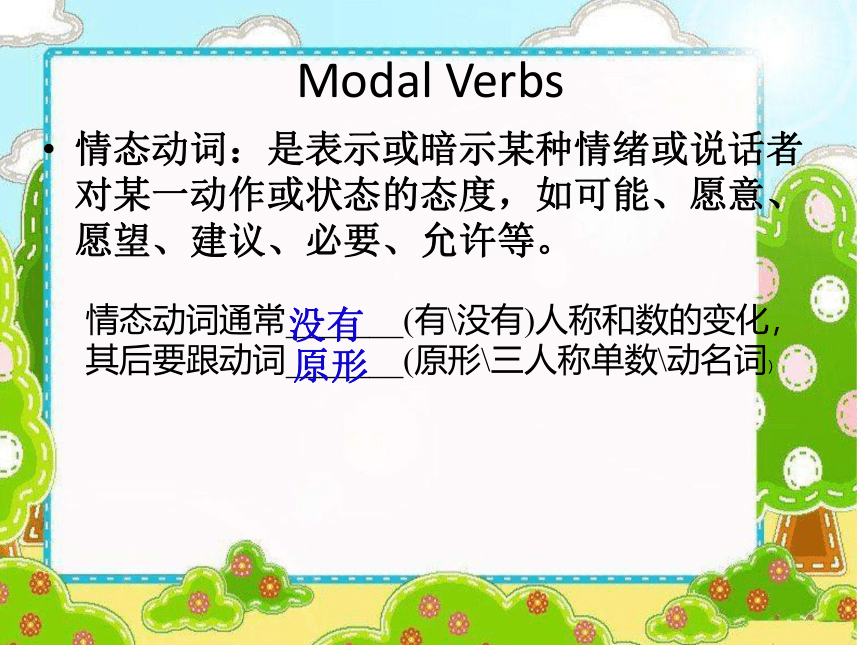
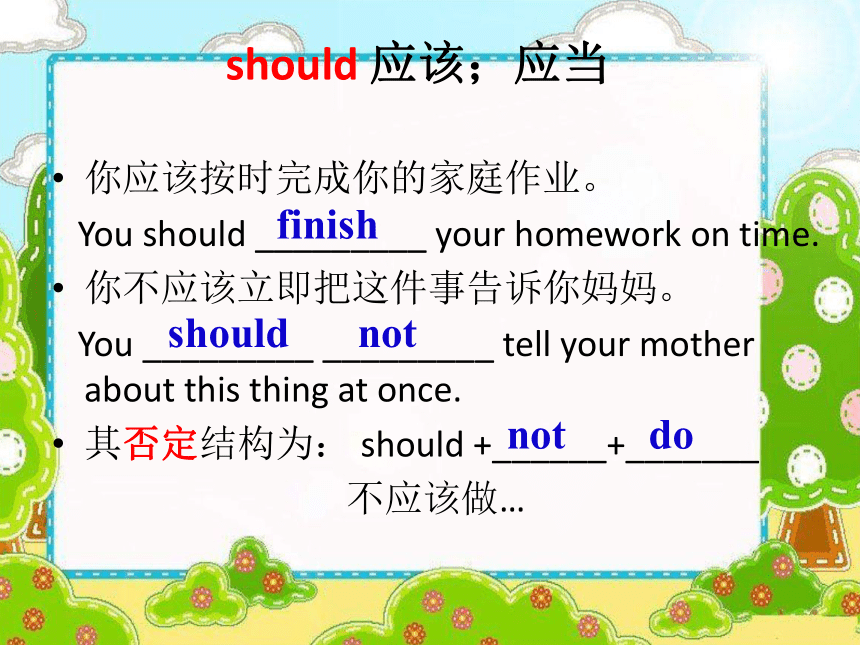
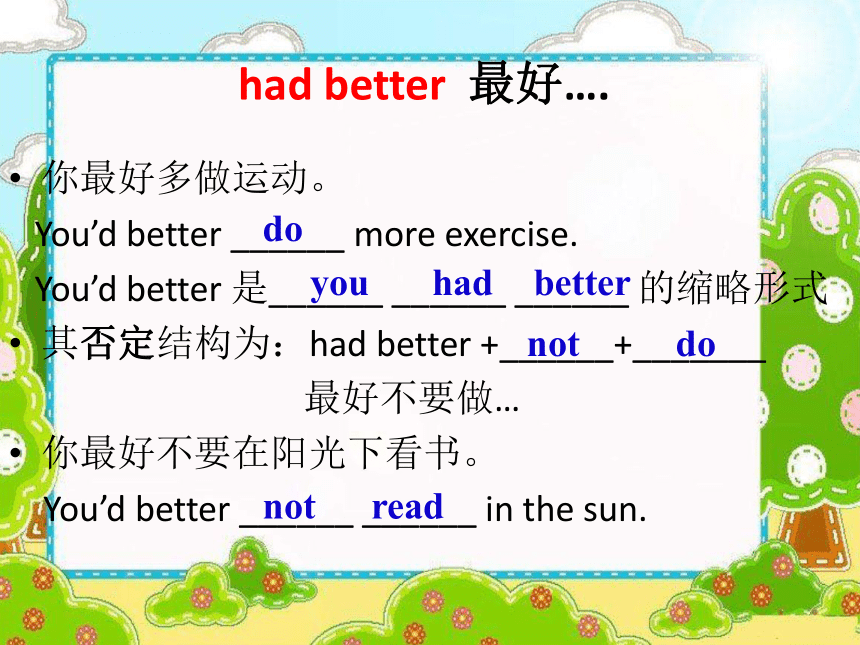
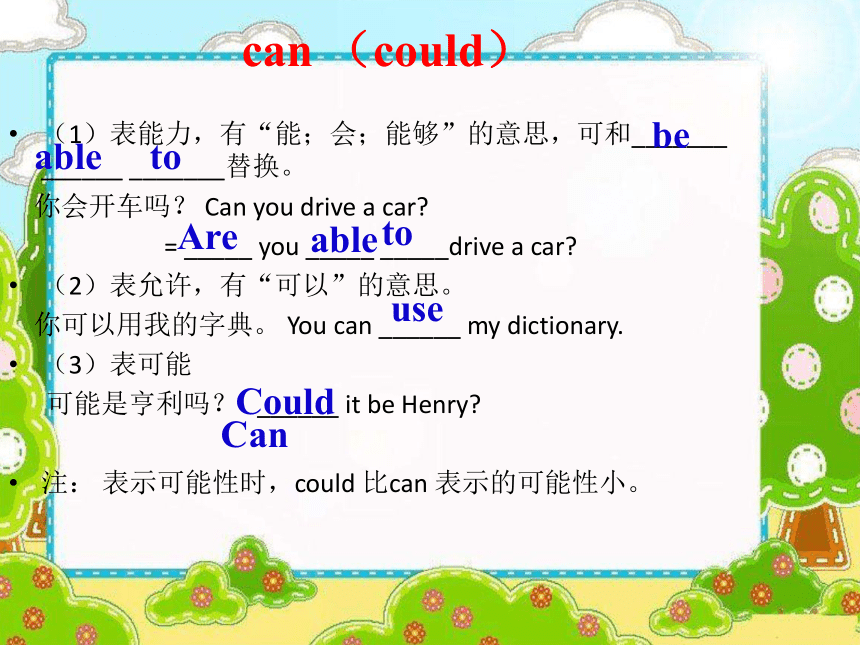
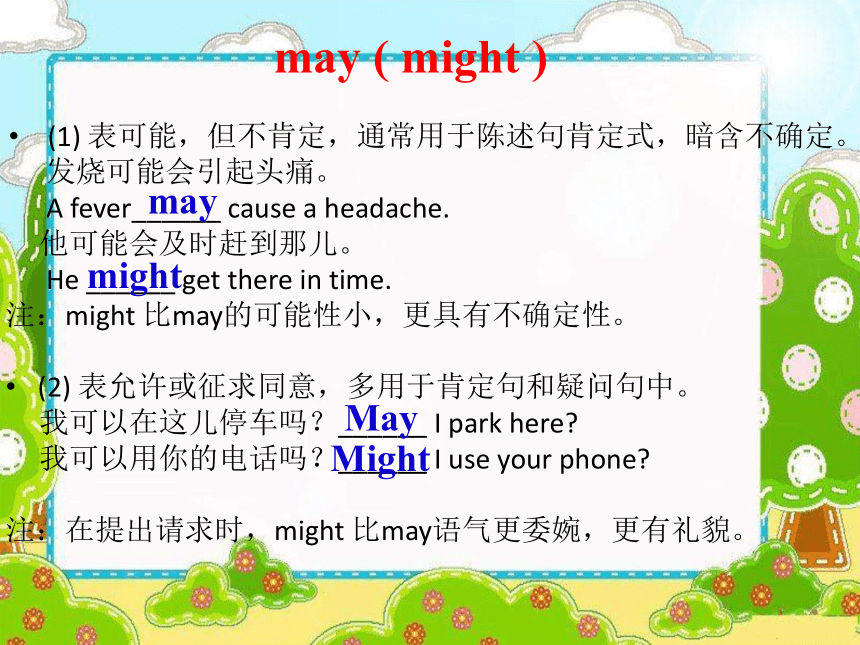
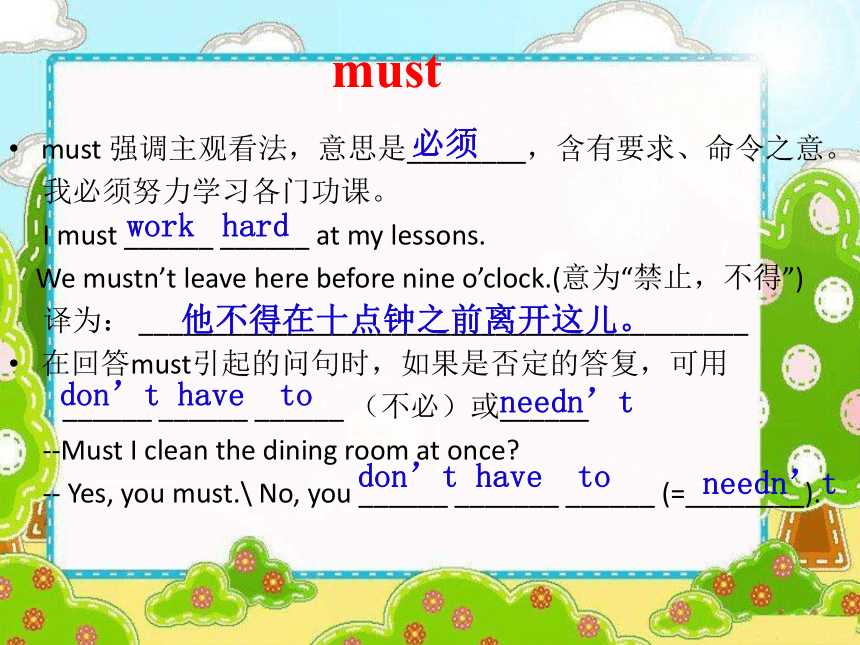
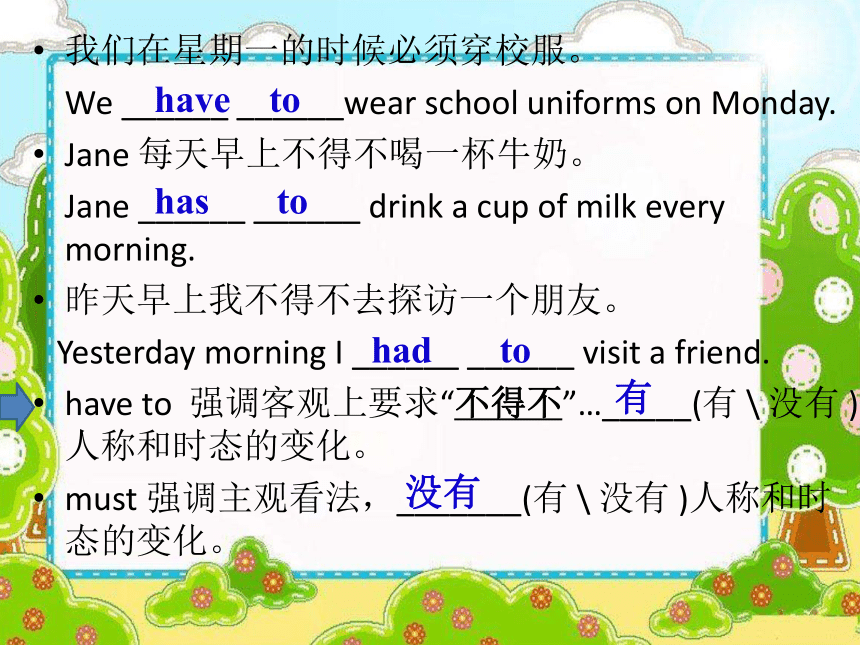
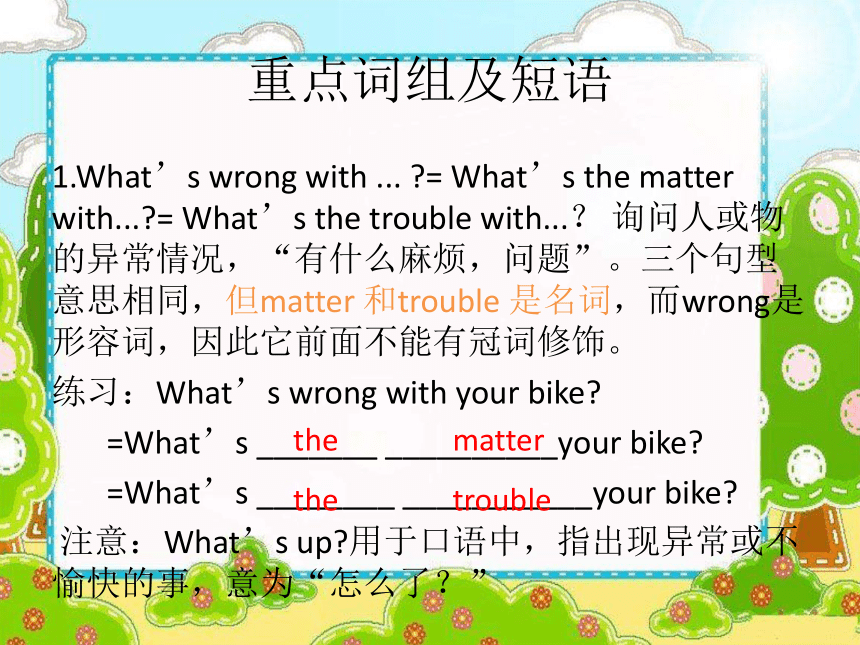
文档简介
(共20张PPT)
Unit 2 Keeping Healthy
复习课件
Modal Verbs
情态动词:是表示或暗示某种情绪或说话者对某一动作或状态的态度,如可能、愿意、愿望、建议、必要、允许等。
情态动词通常_______(有\没有)人称和数的变化,
其后要跟动词_______(原形\三人称单数\动名词)
没有
原形
should 应该;应当
你应该按时完成你的家庭作业。
You should _________ your homework on time.
你不应该立即把这件事告诉你妈妈。
You _________ _________ tell your mother about this thing at once.
其否定结构为: should +______+_______
不应该做…
finish
not
do
should
not
had better 最好….
你最好多做运动。
You’d better ______ more exercise.
You’d better 是______ ______ ______ 的缩略形式
其否定结构为:had better +______+_______
最好不要做…
你最好不要在阳光下看书。
You’d better ______ ______ in the sun.
do
had
you
better
not
do
not
read
can (could)
(1)表能力,有“能;会;能够”的意思,可和_______ ______ _______替换。
你会开车吗? Can you drive a car
= _____ you _____ _____drive a car
(2)表允许,有“可以”的意思。
你可以用我的字典。 You can ______ my dictionary.
(3)表可能
可能是亨利吗? ______ it be Henry
注: 表示可能性时,could 比can 表示的可能性小。
be
able
to
Can
Are
able
to
use
Could
may ( might )
(1) 表可能,但不肯定,通常用于陈述句肯定式,暗含不确定。
发烧可能会引起头痛。
A fever______ cause a headache.
他可能会及时赶到那儿。
He ______ get there in time.
注:might 比may的可能性小,更具有不确定性。
(2) 表允许或征求同意,多用于肯定句和疑问句中。
我可以在这儿停车吗?______ I park here
我可以用你的电话吗?______ I use your phone
注:在提出请求时,might 比may语气更委婉,更有礼貌。
may
might
May
Might
must
must 强调主观看法,意思是________,含有要求、命令之意。
我必须努力学习各门功课。
I must ______ ______ at my lessons.
We mustn’t leave here before nine o’clock.(意为“禁止,不得”)
译为: _________________________________________
在回答must引起的问句时,如果是否定的答复,可用
______ ______ ______ (不必)或______
--Must I clean the dining room at once
-- Yes, you must.\ No, you ______ _______ ______ (=________).
必须
work
hard
他不得在十点钟之前离开这儿。
don’t have to
needn’t
don’t have to
needn’t
我们在星期一的时候必须穿校服。
We ______ ______wear school uniforms on Monday.
Jane 每天早上不得不喝一杯牛奶。
Jane ______ ______ drink a cup of milk every morning.
昨天早上我不得不去探访一个朋友。
Yesterday morning I ______ ______ visit a friend.
have to 强调客观上要求“不得不”…_____(有 \ 没有 )人称和时态的变化。
must 强调主观看法,_______(有 \ 没有 )人称和时态的变化。
have to
has to
had to
有
没有
重点词组及短语
1.What’s wrong with ... = What’s the matter with... = What’s the trouble with...? 询问人或物的异常情况,“有什么麻烦,问题”。三个句型意思相同,但matter 和trouble 是名词,而wrong是形容词,因此它前面不能有冠词修饰。
练习:What’s wrong with your bike
=What’s _______ __________your bike
=What’s ________ ___________your bike
注意:What’s up 用于口语中,指出现异常或不愉快的事,意为“怎么了?”
the matter
the trouble
2.look的用法
(1)look系动词 ,看起来......,后跟形容词。
This skirt looks_______ (美丽的)
Jack didn’t look________(well) yesterday.
(2)look 实意动词,相关短语有:
_______ the books,看着书
_____ _________ 寻找 _______ ________照顾
类似的系动词还有:feel(感觉,摸起来) ,sound(听起来) ,taste(品尝起来),smell(闻起来) get ,become , turn(变得)
练习:1.She feels_______(happy) every day.
2.The leaves turn _________(green) in spring.
beautiful
look at
look for
look after
happy
green
well
3. feel like 的用法
feel like doing sth.想要(做某事),其后接名词,代词,动名词。
= would like to do sth. = want to do sth.
练习:1. I don’t feel like ________ (walk) today.
2. Mr. Wang feels like drinking a cup of coffee.(同义句转换)
=Mr. Wang would like________ _____ a cup of coffee.
=Mr. Wang ______ _________ drink a cup of coffee.
walking
to drink
wants to
3.too much,too many, much too的用法
(1)too much 太多的,相当于一个形容词,修饰不可数名词。也可以放在动词尾不接其他词。
(2)too many 太多的,后接可数名词的复数形式。
(3)much too太,非常,用作副词,后接形容词或副词。
练习:1.There is ______ _______ water on the floor.
2.There are______ _______ books in the library.
3.The box is_______ _______ heavy,I can’t lift it.
4.This new skirt is_______ ________ big for her.
too much
too many
too much
much too
4. something new 一些新的事物
Something,anything, nothing都是不定代词。形容词修饰不定代词,修饰词放在不定代词的后边。
练习:1.I have ________ __________(一些重要的事情) to tell you.
2.It’s______ __________(没什么严重的)。
3. I don’t want to try______ _______。(任何新的东西)
something important
nothing serious
anything new
5. worry的用法。
(1)worry,作动词,“烦恼”,“担心”,常跟介词about.
They _______ _________ the coming exam.
There is nothing to _______ ___________.
(2) be worried about表示“对......担心,忧虑”
He _____ _______ ________ his lessons.
Don’t________ ______ ________ Jack.(不必为Jack 担忧)
Don’t _______ ________ Jack.
worry about
worry about
is worried about
be worried about
worry about
6.give up 放弃
(1) give up sth.代词作宾语,只能放在give和up之间 ,名词作宾语可前可后。
短语:pick up, try on, put away,wake up等
(2)give up doing sth.=stop doing sth.停止做某事
练习:1.You should give up _______ (smoke).
2.You should stop playing computer games(改为同义句)
You should ______ ________playing computer game.
3.She doesn’t want _____ the chance________.(放弃)
smoking
give up
to give up
7.enough to do sth. 足够.......可以做某事
adj.+enough to do ....,可以与 so... that...,(如此...以致于...) too...to(太...而不能...)进行转换。
1.The girl is old enough to go to school.(同义句转换)
= The girl is ______ old _______she can go to school.
2.那个男孩太小了不能搬那个重箱子(翻译)
The boy is ______ young _____ carry the heavy box.
so that
too to
8.prevent防止,预防
prevent sb./ sth . (from) doing阻止某人/某物做某事(keep/stop)
(1)The forest ________wind __________blowing the earth away.
(2) The gatekeeper_______him from________ (go)through the gate.
(3)His parents tried to prevent him from_____(play) games.
(4)Her illness kept her from _______(go) to school.
prevents from
prevents going
playing
going
易考易错习题集
一.用所给词的正确形式填空。
1. Could you please give (I)a hand.
2. He had a headache. He must (see)a doctor.
3. We should (wash) our hands before class.
4. We had better brush our (tooth) twice a day.
5. Linda felt like (eat) hamburger yesterday.
6. You don't look (good). What's wrong with you.
me
see
wash
teeth
eating
well
二. 完成句子
1. What's wrong with you?(改为同义句)
What’s with you?
2. You’d better lie down and have a rest.(改为否定句)
You’d lie down and have a rest.
3. I’m sorry for being late for school. (对划线部分提问)
are you sorry ?
4. It took me fifteen minutes to finish the e-mail. (改为同义句)
I fifteen minutes the e-mail.
5. Would you mind waiting for a while (作出回答)
not.
the matter
better not
What for
spent on/finishing
Of course
书面表达
据调查,中学生面临太多的竞争和压力,体育锻炼的时间少了,身体素质有所下降,视力衰退,精力不足。请根据以下提示要点,写一篇不少于80 词的发言稿,号召同学们加强锻炼。
1.锻炼身体的好处:healthy,energy,strong...
2.锻炼身体的方式:outdoor activities, ball games,running,swimming...
3.请你谈谈对学校开展体育锻炼的看法或建议。(至少两点)
参考词汇:competition(竞争),presssure(压力),eyesight(视力)
Unit 2 Keeping Healthy
复习课件
Modal Verbs
情态动词:是表示或暗示某种情绪或说话者对某一动作或状态的态度,如可能、愿意、愿望、建议、必要、允许等。
情态动词通常_______(有\没有)人称和数的变化,
其后要跟动词_______(原形\三人称单数\动名词)
没有
原形
should 应该;应当
你应该按时完成你的家庭作业。
You should _________ your homework on time.
你不应该立即把这件事告诉你妈妈。
You _________ _________ tell your mother about this thing at once.
其否定结构为: should +______+_______
不应该做…
finish
not
do
should
not
had better 最好….
你最好多做运动。
You’d better ______ more exercise.
You’d better 是______ ______ ______ 的缩略形式
其否定结构为:had better +______+_______
最好不要做…
你最好不要在阳光下看书。
You’d better ______ ______ in the sun.
do
had
you
better
not
do
not
read
can (could)
(1)表能力,有“能;会;能够”的意思,可和_______ ______ _______替换。
你会开车吗? Can you drive a car
= _____ you _____ _____drive a car
(2)表允许,有“可以”的意思。
你可以用我的字典。 You can ______ my dictionary.
(3)表可能
可能是亨利吗? ______ it be Henry
注: 表示可能性时,could 比can 表示的可能性小。
be
able
to
Can
Are
able
to
use
Could
may ( might )
(1) 表可能,但不肯定,通常用于陈述句肯定式,暗含不确定。
发烧可能会引起头痛。
A fever______ cause a headache.
他可能会及时赶到那儿。
He ______ get there in time.
注:might 比may的可能性小,更具有不确定性。
(2) 表允许或征求同意,多用于肯定句和疑问句中。
我可以在这儿停车吗?______ I park here
我可以用你的电话吗?______ I use your phone
注:在提出请求时,might 比may语气更委婉,更有礼貌。
may
might
May
Might
must
must 强调主观看法,意思是________,含有要求、命令之意。
我必须努力学习各门功课。
I must ______ ______ at my lessons.
We mustn’t leave here before nine o’clock.(意为“禁止,不得”)
译为: _________________________________________
在回答must引起的问句时,如果是否定的答复,可用
______ ______ ______ (不必)或______
--Must I clean the dining room at once
-- Yes, you must.\ No, you ______ _______ ______ (=________).
必须
work
hard
他不得在十点钟之前离开这儿。
don’t have to
needn’t
don’t have to
needn’t
我们在星期一的时候必须穿校服。
We ______ ______wear school uniforms on Monday.
Jane 每天早上不得不喝一杯牛奶。
Jane ______ ______ drink a cup of milk every morning.
昨天早上我不得不去探访一个朋友。
Yesterday morning I ______ ______ visit a friend.
have to 强调客观上要求“不得不”…_____(有 \ 没有 )人称和时态的变化。
must 强调主观看法,_______(有 \ 没有 )人称和时态的变化。
have to
has to
had to
有
没有
重点词组及短语
1.What’s wrong with ... = What’s the matter with... = What’s the trouble with...? 询问人或物的异常情况,“有什么麻烦,问题”。三个句型意思相同,但matter 和trouble 是名词,而wrong是形容词,因此它前面不能有冠词修饰。
练习:What’s wrong with your bike
=What’s _______ __________your bike
=What’s ________ ___________your bike
注意:What’s up 用于口语中,指出现异常或不愉快的事,意为“怎么了?”
the matter
the trouble
2.look的用法
(1)look系动词 ,看起来......,后跟形容词。
This skirt looks_______ (美丽的)
Jack didn’t look________(well) yesterday.
(2)look 实意动词,相关短语有:
_______ the books,看着书
_____ _________ 寻找 _______ ________照顾
类似的系动词还有:feel(感觉,摸起来) ,sound(听起来) ,taste(品尝起来),smell(闻起来) get ,become , turn(变得)
练习:1.She feels_______(happy) every day.
2.The leaves turn _________(green) in spring.
beautiful
look at
look for
look after
happy
green
well
3. feel like 的用法
feel like doing sth.想要(做某事),其后接名词,代词,动名词。
= would like to do sth. = want to do sth.
练习:1. I don’t feel like ________ (walk) today.
2. Mr. Wang feels like drinking a cup of coffee.(同义句转换)
=Mr. Wang would like________ _____ a cup of coffee.
=Mr. Wang ______ _________ drink a cup of coffee.
walking
to drink
wants to
3.too much,too many, much too的用法
(1)too much 太多的,相当于一个形容词,修饰不可数名词。也可以放在动词尾不接其他词。
(2)too many 太多的,后接可数名词的复数形式。
(3)much too太,非常,用作副词,后接形容词或副词。
练习:1.There is ______ _______ water on the floor.
2.There are______ _______ books in the library.
3.The box is_______ _______ heavy,I can’t lift it.
4.This new skirt is_______ ________ big for her.
too much
too many
too much
much too
4. something new 一些新的事物
Something,anything, nothing都是不定代词。形容词修饰不定代词,修饰词放在不定代词的后边。
练习:1.I have ________ __________(一些重要的事情) to tell you.
2.It’s______ __________(没什么严重的)。
3. I don’t want to try______ _______。(任何新的东西)
something important
nothing serious
anything new
5. worry的用法。
(1)worry,作动词,“烦恼”,“担心”,常跟介词about.
They _______ _________ the coming exam.
There is nothing to _______ ___________.
(2) be worried about表示“对......担心,忧虑”
He _____ _______ ________ his lessons.
Don’t________ ______ ________ Jack.(不必为Jack 担忧)
Don’t _______ ________ Jack.
worry about
worry about
is worried about
be worried about
worry about
6.give up 放弃
(1) give up sth.代词作宾语,只能放在give和up之间 ,名词作宾语可前可后。
短语:pick up, try on, put away,wake up等
(2)give up doing sth.=stop doing sth.停止做某事
练习:1.You should give up _______ (smoke).
2.You should stop playing computer games(改为同义句)
You should ______ ________playing computer game.
3.She doesn’t want _____ the chance________.(放弃)
smoking
give up
to give up
7.enough to do sth. 足够.......可以做某事
adj.+enough to do ....,可以与 so... that...,(如此...以致于...) too...to(太...而不能...)进行转换。
1.The girl is old enough to go to school.(同义句转换)
= The girl is ______ old _______she can go to school.
2.那个男孩太小了不能搬那个重箱子(翻译)
The boy is ______ young _____ carry the heavy box.
so that
too to
8.prevent防止,预防
prevent sb./ sth . (from) doing阻止某人/某物做某事(keep/stop)
(1)The forest ________wind __________blowing the earth away.
(2) The gatekeeper_______him from________ (go)through the gate.
(3)His parents tried to prevent him from_____(play) games.
(4)Her illness kept her from _______(go) to school.
prevents from
prevents going
playing
going
易考易错习题集
一.用所给词的正确形式填空。
1. Could you please give (I)a hand.
2. He had a headache. He must (see)a doctor.
3. We should (wash) our hands before class.
4. We had better brush our (tooth) twice a day.
5. Linda felt like (eat) hamburger yesterday.
6. You don't look (good). What's wrong with you.
me
see
wash
teeth
eating
well
二. 完成句子
1. What's wrong with you?(改为同义句)
What’s with you?
2. You’d better lie down and have a rest.(改为否定句)
You’d lie down and have a rest.
3. I’m sorry for being late for school. (对划线部分提问)
are you sorry ?
4. It took me fifteen minutes to finish the e-mail. (改为同义句)
I fifteen minutes the e-mail.
5. Would you mind waiting for a while (作出回答)
not.
the matter
better not
What for
spent on/finishing
Of course
书面表达
据调查,中学生面临太多的竞争和压力,体育锻炼的时间少了,身体素质有所下降,视力衰退,精力不足。请根据以下提示要点,写一篇不少于80 词的发言稿,号召同学们加强锻炼。
1.锻炼身体的好处:healthy,energy,strong...
2.锻炼身体的方式:outdoor activities, ball games,running,swimming...
3.请你谈谈对学校开展体育锻炼的看法或建议。(至少两点)
参考词汇:competition(竞争),presssure(压力),eyesight(视力)
同课章节目录
- Unit 1 Playing Sports
- Topic 1 I'm going to play basketball.
- Topic 2 I'll kick you the ball again.
- Topic 3 The school sports meet is coming.
- Unit 2 Keeping Healthy
- Topic 1 You should brush your teeth twice a day.
- Topic 2 I must ask him to give up smoking.
- Topic 3 Must we exercise to prevent the flu?
- Unit 3 Our Hobbies
- Topic 1 What's your hobby?
- Topic 2 What sweet music!
- Topic 3 What were you doing at this time yesterday
- Unit 4 Our World
- Topic 1 What's the strongest animal on the farm?
- Topic 2 How can we protect ourselves from the eart
- Topic 3 The Internet makes the world smaller.
